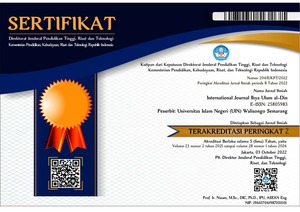Pengembangan Maqasid Al-Syari’ah Perspektif Thahir Ibnu ‘Asyur
DOI:
https://doi.org/10.21580/ihya.21.1.4220Keywords:
rekonstruksi, maqashid al-syari’ah, Ibnu ‘Asyur, dialog, realitasAbstract
The essence of Islamic law is to attract the good (maslahat) of humans and reject the danger from it. Therefore, in addition to carrying out the shari'ah, humans are required to understand the aims and objectives of the shari'ah set. Departing from the above statement, this study will examine the efforts of Thahir ibnu ‘Asyur in developing concepts related to the science of maqasid al-shari'ah.
The data of this research is library. The data collection method uses the documentation method, which is: collecting, then analyzing the data collected. After the data has been collected, data analysis is carried out by means of data reduction, presentation of data in narrative form, and drawing conclusions.
This study concludes that the maqasid al-shari'ah, as stated by Thahir ibnu ‘Asyur, is the spirit of all human actions relating to the laws established by Islamic shari’ah, especially in dealing with a number of problems in this millennial era. In addition, said Thahir ibnu ‘Asyur, the main reason for the decline of fiqh is the neglect of scholars towards the study of maqasid which results in the distortion of shari'ah values themselves. The opinion of Thahir ibnu ‘Asyur above is supported by ‘Allal al-Fasi, one of the experts in contemporary maqasid al-shari’ah, who asserted that the main condition for success in dialoguing fiqh with contemporary reality is the rise or failure of scholars' responses to the study of maqasid. This is where the role of maqasid al-shari'ah as the spirit of each fiqh law finds its momentum. Its elastic characteristics, across space and time, are expected to be able to dialogue with problems that continue to emerge. These characteristics are able to adapt to every civilization that runs and play a role in arousing Islamic civilization that is lagging behind other civilizations.
Downloads
References
‘Asyur, Muhammad Thahir. 1984. Alaisa al-Subh bi Qarib. Dar al-Tunisiah li al-Nasyr
______________________. 2006. Ushul al-Nidzam al-Ijtima’i. Cet. II. Kairo: Dar al-Salam
Abdullah, M. Amin. 1995. Falsafah Kalam di Era Postmodernisme. Yogyakarta: Pustaka Pelajar
Al-Fasi, ‘Allal. 1993. Maqashid al-Syariah al-Islamiyah wa Makarimiha. Dar al-Gharb al-Islami
Al-Hasanî, Isma’îl. 1995. Nazarîyat al-Maqâsid ‘inda Muhammad Tâhir b. ‘Âshûr. Virginia: al-Ma’had al-‘Âlam li al-Fikr al-Islâmî
Al-Khadimy, Nuruddin. 1998. Al-Ijtihad al-maqashidy. Vol 1. Qatar: Wizarah al-auqaf wa al-syuun al-Islamiah
___________________. 2010. Ilm al-Maqâsid al-Shar‘îyah. Beirut: Maktabah al-Abîkân
Al-Misawî, Muhammad Tâhir. 2001. “Kata Pengantar” dalam Maqâsid al-Syarî‘ah al-Islâmîyah, Cet. Ke-2. Yordania: Dâr al-Nafâis
Al-Muqrî, Ahmad b. Muhammad b. ‘Alî al-Fayyûmî. 1987. Al-Misbâh al-Munîr fî Gharîb al-Syarh al-Kabîr li al-Râfi‘î. Beirut: Maktabah Lubnan
Al-Qardhawi, Yusuf. 2008. Dirasah fi Fiqh Maqasid al-Syariah, cet. Ke-3. Kairo: Dar al-Syuruq
Ash-Shiddieqiy, Nourouzzaman. 1998. Jeram-jeram Peradaban Muslim. Yogyakarta: Pustaka Pelajar
Ibnu ‘Âsyûr, Muhammad Tâhir. 2001. Maqâsid al-Syarî‘ah al-Islamîyah, komentator Muhammad Tâhir al-Misawî. Yordania: Dâr al-Nafâ‟is, Cet. Ke-2.
Khalid, Iyad. 1995. Muhamad Tahir bin 'Asyur. Damaskus: Dar al-Qalam
Mawardi, Ahmad Imam. 2012. Fiqh Minoritas Fiqh Al Aqalliyyat dan Evolusi Maqashid al Syari’ah Dari Konsep Ke Pendekatan. Yogjakarta: LKIS
Raisuni, Ahmad. 1995. Nadzariat al-Maqashid ‘inda Imam al-Syathibi. Jeddah: Dar al-Ilmiah li al-Kitab al-Islami
_____________. 2003. Al-Bahts fi Maqashid Asy-Syari’ah; Nassy’atuh wa Tathawwuruh wa Mustabaluh, Makalah forum ilmiah internasional tentang Maqashid Syari’ah. London: Muassasah Al-Furqan li At-Turats
Santhleir, Bartlomey. 2008. Al-Siyasah li Aristoteles. Diterjemahkan dalam bahasa Arab oleh Ahmad Luthfi Sayyid. Kairo: Haiah al-Misriah al-‘Ammah
Downloads
Published
How to Cite
Issue
Section
License
By submitting an article to the journal, the author(s) agree to transfer the published article's copyright to the journal, which will act as the publisher. This means the journal will have the right to publish the article in various forms, including reprints. The journal will maintain the publishing rights to the published articles.
This work is licensed under Creative Commons Attribution-ShareAlike 4.0 International License.
In line with the license, authors and third parties (readers, researchers, and others) are allowed to share and adapt the material. In addition, the material must be given appropriate credit, provided with a link to the license, and indicated if changes were made. If authors remix, transform or build upon the material, authors must distribute their contributions under the same license as the original.



